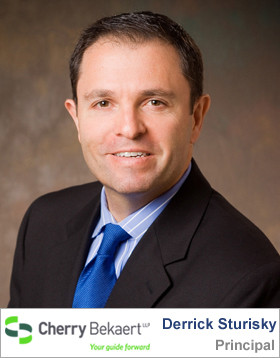
Derrick Sturisky has been a management consultant with large global firms for over 20 years serving clients around the world. He has worked in the US, South Africa, Europe, Australia, and Canada. He grew up in Johannesburg, South Africa, and graduated with a degree in Computer Science from The University of the Witwatersrand. “I had been selling computers as a part-time job for many years during high-school, and Computer Science was a natural decision for me.”
After graduation, he joined the Johannesburg office of Accenture in 1990, and began his career as a traditional IT consultant. “This was a terrific way to start a career in professional services – especially for new graduates – in learning the profession, interacting with colleagues/clients around the word, and participating on global, strategic projects.” One important lesson he learned early-on, was emphasis on client service and quality. This is a legacy which he has continued to embrace over the past 20 years.
Sturisky has recently transitioned from his role as Accenture Partner, and is now an independent management consultant based in Atlanta. He will be serving clients in the following major disciplines:
Views on ERM
Sturisky believes that “ERM should serve a more strategic purpose than simply providing risk information to management and the Board on a periodic basis.”
According to Sturisky, Senior Executives realize that risk, strategy, and operations are inter-connected. Organizations that have invested – formally or informally - in risk management capability expect more than static, retroactive, crude risk reports. They are demanding – understandably so - a significant return on their risk management investment beyond a list of top tier, prioritized enterprise risks. ERM should, he believes, provide this type of risk information – however, ERM should also be integrated with key business routines (e.g., strategic planning, supply chain etc.), and leveraged for special projects. ERM needs to be more than traditional insurance (risk transfer) and should be called upon to participate in all major organizational initiatives. Sturisky has seen ERM support M&A activities, geographic expansion, and new market entry. However, he asserts, that ERM needs to continue to further demonstrate its value – and its potential.
Emerging Opportunity - Project Risk
Sturisky is quick to note that the ERM domain is evolving. One key trend he noticed during recent work in Africa, appears to be an increasing emphasis on Capital Project Risk – how to increase the likelihood of capital intensive projects (IT or otherwise) being delivered on time, under budget, and within user expectations. Sturisky is considering developing a Project Risk Certification to support this trend.
Sturisky says “I see a great deal of potential for progressive CIO’s and COO’s to embrace a more robust risk-discussion in their PMO frameworks for large, strategic projects. This risk approach should be aligned with – yet independent of - the traditional PMO framework to encourage a more realistic, robust assessment of project risk. It also provides a platform for IT or Operations to have an independent view of threats to success of their strategic initiatives.
Moving to the US
Sturisky moved in Atlanta in 1995 with Deloitte, and continued his career as an SAP implementation consultant for five years. “Working in the US was a unique, challenging, and rewarding experience. Around 2000, I elected to transition from IT into the risk management domain, focusing on ERM, and related risk-related disciplines.”
Ironically, Sturisky, is one of the few risk consultants around the world with the word ‘risk’ in his name. Over the past 14 years he has been fortunate to have provided risk services to some of the world’s largest organizations, and is proud to have developed relationships with Board Members, Chief Audit Executives, Chief Risk Officers, Risk Directors, Chief Financial Officers, other corporate executives, NGO’s, and academia. In some cases, he has been providing advisory services to the same clients for many years - one of his most memorable projects was an ERM Capability improvement project for a large consumer brands beverage company in Atlanta, which resulted in a five year sustained advisory relationship.
Sturisky believes that ERM Frameworks should support, integrate, and enable related business functions – such as Business Continuity Planning, Incident Management, Compliance, Security, and Disaster Recovery Planning. ERM should also be proactive and forward looking – increasingly, his clients are now demanding that ERM assist is identifying, long term emerging risks.
Sturisky believes that ERM Frameworks should be:
After working with multiple Boards (across industries and geographies) for many years, Sturisky notes that members tend to ask similar questions:
Sturisky is a sports enthusiast, having played competitive squash, and is certified as a Level 2 Rugby Union Referee. He is, of course, a partisan Springbok and Eagle supporter. He is also the coach of his son’s Flag Football team. According to Sturisky, referring a rugby match is an intriguing, challenging and rewarding experience – not unlike a typical management consulting engagement. The match needs to be managed with impartiality/independence, knowledge of spirit and letter of the law, accuracy, and efficacy. There is no substitute for technical capability, practical experience, appreciation of the game, the correct attitude, and a professional approach. Ideally players and fans should not notice the referee during the game. This is similar to the role of a management consultant – who should facilitate the process, encourage positive, constructive project development, support informed decision making, and efficient, effective operational execution/performance.
Independent Management Consulting
Since transitioning into his new role, Sturisky says that his clients have been highly receptive to his value proposition of:
Sturisky concludes “I enjoy assisting my clients in the design, development, and adoption of innovative, progressive, flexible, and robust risk management frameworks – that support in reducing risk exposure, increasing compliance, lowering cost, and improving business performance.”
Secrets to Sustained Consulting Success:
PREVIOUS NEWS